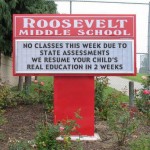One of the hardest parts of teaching is learning how and when to assess your students. In colleges across the country there are entire classes that teach aspiring teachers how and when to assess. However what happens after you create the assessment? How do make sure students are able to accurately complete their assessment? These are all questions teachers have but somehow a are never answered in the countless professional development we have to endure on a yearly basis. After being in the classroom for twelve years, I’ve realized that assessments only matter if the learning tasks are relevant, rigorous and more importantly interesting.
As a veteran teacher, I work in an environment where most of the students are behind academically. They are not reading on their appropriate grade level and their writing lacks basic fundamentals. So before I assign any assessment, I have to make sure that I create logical mini learning tasks to ensure that students grasp the overarching complex task.
For example, in my World Literature class students have been learning about the atrocities that occurred during the Jewish Holocaust by reading the memoir, Night by Elie Wiesel. Using one of our ‘newly minted’ Common Core writing standards, my ultimate goal was to have students write a synthesis essay where they took a position on the impact the Jewish holocaust had on the formation of the Jewish state, Israel. However,as I looked at what the ultimate product was supposed to be (the synthesis essay) I was immediately fearful that my students would give up before we even started. This was a new standard, so I knew this was going to be a difficult task.
In an attempt to not overwhelm my students, but to make sure they were receiving the rigor of the assignment, I decided to use these strategies :
- I pre-assessed the skills students would need to be able to complete their performance assessment. Since I’ve taught my kids all year, I already had a clear picture of their writing and comprehension abilities. I decided to pair students in groups with students of all writing abilities so that there was no group that was superior to one another.
- I scaffolded what the students already knew the topic. From looking at data of their writing skills, I knew there were significant gaps in reading and writing so for each learning task I developed addressed these gaps while giving kids ample opportunity to practice their needed skills.
- I sequenced learning tasks that were realistic for your children to complete in a ‘set’ amount of time. My kids work at a slower pace due to comprehension issues so I made sure to give students time to complete the task. For example, my kids took a couple of weeks to understand reading primary sources for information. Everyday that I introduced new documents, I had to spend time making sure students understood the main point of the document.
- Gave timely feedback on the learning tasks so students can be re mediate on tasks not mastered. This is hard- especially when you have 30 students in a class. I use tools such as Paperrater to help me grade papers in a timely manner. While these assignments don’t identify every mistake, they do allow me see the overall quality of a paper. I also make sure to have at least 5-10 minutes to discuss with students their papers that are being handed out. That way I can explain my comments and offer ideas for students to get stronger.
- Allowed adequate time for students to process the information they’re receiving. Sometimes it takes students time to process the information they are receiving. That’s why I allow students time to work in class, in groups and individually so that I can see who needs more time, who is struggling and who understands everything I’m teaching them.
In the end, students were able to complete the assignment with varied results. Some students wrote excellent essays while others struggled immensely. So our next task is to work on revisions of the essays so that students understand writing is a process- not a final destination.
What do you do to create learning tasks that lead to better understanding in the classroom?






Timely feedbacks are critical for the effectiveness of any study program. Meticulous planning and detailed strategies are an important part of teaching profession. Thanks for sharing these insights